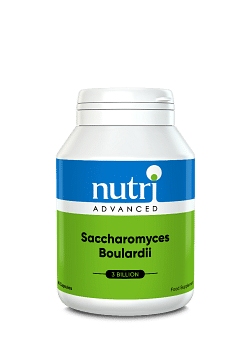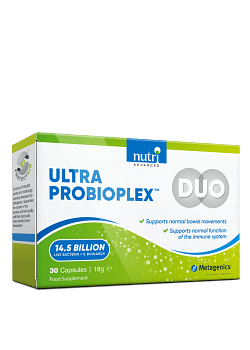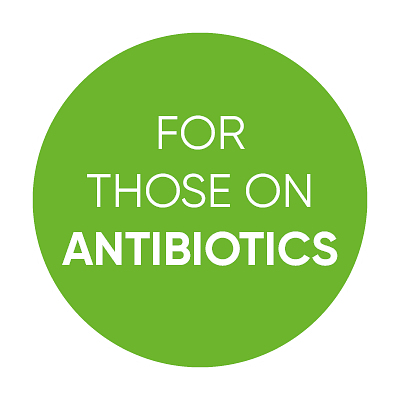Research Shows Saccharomyces Boulardii Can Prevent & Reduce Diarrhoea
Why you can trust Nutri Advanced Every article on our site is researched thoroughly by our team of highly qualified nutritionists. Find out more about our editorial process.
If you’ve ever taken antibiotics, worried about Travellers' diarrhoea or struggle with IBS-related loose stools, then Saccharomyces boulardii could be a very useful probiotic for you…
What is Saccharomyces boulardii?
Saccharomyces boulardii is the only strain of yeast to have been formally recognised as a probiotic. S. boulardii works a bit differently to other probiotics though. It is a transient yeast, which means it doesn’t colonise the gut, but has its own (very) impressive list of health benefits:
✓ It has a sticky outer surface and can attach to a wide range of infectious micro-organisms, helping to eliminate them from the body.
✓ It produces natural anti-fungal agents such as caprylic acid and can help the body to eliminate harmful yeasts such as Candida albicans.
✓ It supports nutrient absorption, helps to prevent allergies and supports immune function.
S. boulardii’s best researched benefit however is as a natural agent to prevent or reduce many types of diarrhoea including paediatric diarrhoea, antibiotic-associated diarrhoea, acute diarrhoea and travellers’ diarrhoea caused by bacteria, viral or parasites.
Travellers' diarrhoea
S. boulardii is now strongly recommended for the prevention of travellers' diarrhoea.
In terms of frequency and economic impact, travellers' diarrhoea is the No.1 health problem for international travel; travellers' diarrhoea is estimated to affect more than 60% of travellers to developing countries. Symptoms include vomiting, abdominal cramps, fever and diarrhoea; and while spontaneous recovery usually occurs after 4 days, some patients may have symptoms for weeks, and some go on to develop irritable bowel syndrome.
In a 2010 systematic review and meta-analysis of the evidence for the safety and efficacy of S. boulardii, scientific researchers concluded that:
“S. boulardii can be strongly recommended for the prevention of antibiotic associated diarrhoea and travellers' diarrhoea.”1
Antibiotic-associated diarrhoea
Overuse of antibiotics has become a significant global problem, and side effects such as diarrhoea are both problematic and incredibly common. S. boulardii is resistant to antibiotics and can be successfully used alongside antibiotics. The effectiveness of S. boulardii for the prevention of antibiotic side effects has been demonstrated in a number of human clinical trials and meta-analyses. In a study of 193 patients, administration of S. boulardii (1000 mg per day) from the beginning of antibiotic treatment and continued for 3 days after the course, significantly prevented the occurrence of diarrhoea compared to placebo.2 In another study of 338 patients taking antibiotics, S. boulardii (200 mg per day) significantly reduced the incidence of diarrhoea compared to placebo.3A 2015 meta-analysis including twenty-one randomised controlled trials involving 4780 participants showed that administration of S. boulardii concomitantly with antibiotics, compared to placebo or no intervention, reduces the risk of antibiotic-associated diarrhoea in both adults and children.4
IBS-associated diarrhoea
S. boulardii is also widely used to improve stool consistency in IBS patients with symptoms of diarrhoea. In a double-blind, placebo-controlled study in 34 patients with diarrhoea-predominant IBS, treatment with S. boulardii was found to decrease the daily number of stools and improved their consistency after 1 month of treatment.4
Saccharomyces boulardii – A proven, highly effective, natural support
Research into the beneficial effects of Saccharomyces boulardii continues to propel forward at an exciting rate. For many people struggling with, or worrying about the uncomfortable and often distressing symptoms of diarrhoea that can quickly ruin a holiday or affect everyday quality of life, S. boulardii offers simple, natural, relatively inexpensive and highly effective support. And with a proven safety profile, it’s certainly worth a try.
References:
1. Mcfarland LV. Systematic review and meta-analysis of Saccharomyces boulardii in adult patients. World J Gastroenterol 2010 May 14; 16(18): 2202-2222
2. Surawicz CM, Elmer GW, Speelman P, et al. Prevention of antibiotic-associated diarrhoea by Saccharomyces boulardii: a prospective study. Gastroenterology 1989; 96: 981–8.2
3. Adam P. Essais cliniques controle´s en double insu de l’ultra-levure lyophilise´e (e´tude multicentrique par 25 me´decins de 388 cas). Me´d Chir Dig 1976; 5: 401–6.
4. Szajewska, H. & Kolodziej, M. (2015). Systematic review with meta-analysis: Saccharomyces boulardii in the prevention of antibiotic-associated diarrhoea. Alimentary Pharmacology and Therapeutics 42(7); 793-801.
5. Maupas, J., Champemont, P., and Delforge, M. (1983). Treatment of irritable bowel syndrome with Saccharomyces boulardii: a double-blind, placebo-controlled-study. Med Chir Dig 12, 77-79.
This website and its content is copyright of Nutri Advanced ©. All rights reserved. See our terms & conditions for more detail.
Nutri Advanced has a thorough research process and for any references included, each source is scrutinised beforehand. We aim to use the highest value source where possible, referencing peer-reviewed journals and official guidelines in the first instance before alternatives. You can learn more about how we ensure our content is accurate at time of publication on our editorial policy.
Most Popular Articles
-
7 Surprising Ways To Support Your Magnesium
If you are displaying signs of a magnesium deficiency, here are 7 ways to boost your magnesium levels that are easy to incorporate into your daily life. -
5 Best Vitamin C Supplements Picked By Our Experts
Learn more about the different types of vitamin C, the different benefits you get from different types, and what you get for spending more on a good supplement. -
Top 5 Vitamins For Energy And Tiredness Picked By Our Experts
The 5 best and most important vitamins for energy & tiredness including B vitamin food sources & best supplement forms for energy. -
Benefits of Myo-Inositol for Polycystic Ovary Syndrome (PCOS)
In this research review article, we take a closer look at a lesser-known natural compound called myo-inositol that has been found to have significant potential to improve many of the prevalent features of PCOS. -
Top 10 Reasons to Give Your Kids Omega-3
Read the top 10 reasons that kids should have plenty of Omega-3- an essential fatty acid- including for depression, brain function, sleep & reading/maths skills.











